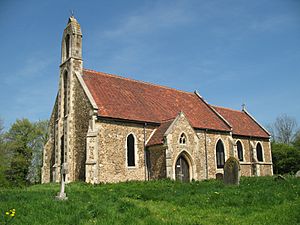St Denis Church, East Hatley facts for kids
Quick facts for kids St Denis' Church, East Hatley |
|
|---|---|
 |
|
| Lua error in Module:Location_map at line 420: attempt to index field 'wikibase' (a nil value). | |
| Type | Local Nature Reserve |
| Location | East Hatley, Cambridgeshire, England |
| OS grid | TL 285 505 |
| Area | 200 square metres |
| Managed by | Friends of Friendless Churches |
St Denis' Church, East Hatley is an old church building in East Hatley, Cambridgeshire, England. It is no longer used for church services. This special building is a listed building, meaning it's an important historical site. Its churchyard, which is still used for burials, is also a Local Nature Reserve. This means it's a protected area for nature. The Friends of Friendless Churches group now owns and takes care of the church.
Contents
History of St Denis' Church
The church was first built a very long time ago, in the early 1200s. It was fixed up by a famous architect named William Butterfield in 1874. The last time people used the church for worship was in 1959.
What Happened to the Church?
In 1985, the church was officially stopped from being used for religious services. It was then given to the South Cambridgeshire District Council. By 2003, the building was in very bad shape. Because it is a listed building, the council agreed to pay to have it fixed. On November 30, 2016, the church was given to the Friends of Friendless Churches. This group works to save old churches that are no longer used.
Nature in the Churchyard
The churchyard around St Denis' Church is a special place for plants. Most of the grass is neutral grassland, which means the soil is not too acidic or too alkaline. However, some parts have calcareous soil, which is rich in lime.
Plants and Flowers
Because of the different soil types, the churchyard has many kinds of grasses and flowers. You can find beautiful flowers like hoary plantain, rough hawkbit, and oxlip growing there. It's a great spot to see local wildlife and plants.
How to Visit
You can get to St Denis' Church by following a footpath. This path starts from the road called East Hatley, which is in the village of East Hatley.
 | Laphonza Butler |
 | Daisy Bates |
 | Elizabeth Piper Ensley |

